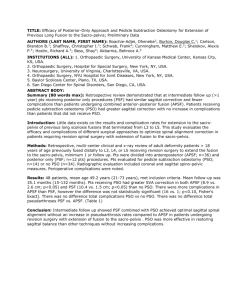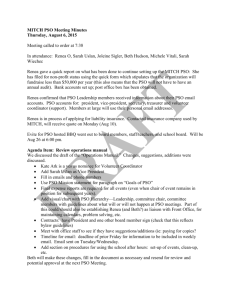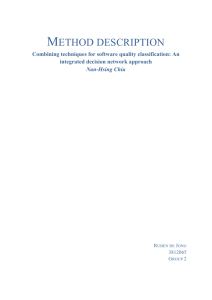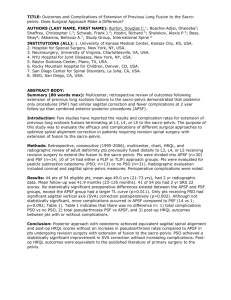Q&B MODEL NONSTOCK SOLE CORPORATE MEMBER BYLAWS
advertisement
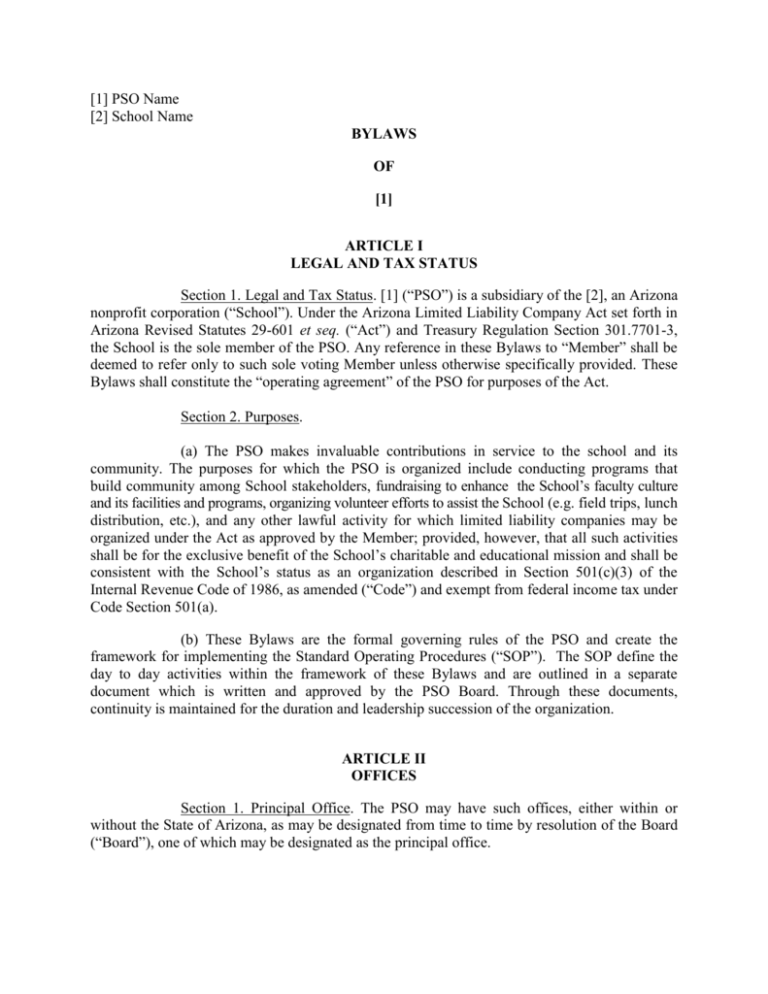
[1] PSO Name [2] School Name BYLAWS OF [1] ARTICLE I LEGAL AND TAX STATUS Section 1. Legal and Tax Status. [1] (“PSO”) is a subsidiary of the [2], an Arizona nonprofit corporation (“School”). Under the Arizona Limited Liability Company Act set forth in Arizona Revised Statutes 29-601 et seq. (“Act”) and Treasury Regulation Section 301.7701-3, the School is the sole member of the PSO. Any reference in these Bylaws to “Member” shall be deemed to refer only to such sole voting Member unless otherwise specifically provided. These Bylaws shall constitute the “operating agreement” of the PSO for purposes of the Act. Section 2. Purposes. (a) The PSO makes invaluable contributions in service to the school and its community. The purposes for which the PSO is organized include conducting programs that build community among School stakeholders, fundraising to enhance the School’s faculty culture and its facilities and programs, organizing volunteer efforts to assist the School (e.g. field trips, lunch distribution, etc.), and any other lawful activity for which limited liability companies may be organized under the Act as approved by the Member; provided, however, that all such activities shall be for the exclusive benefit of the School’s charitable and educational mission and shall be consistent with the School’s status as an organization described in Section 501(c)(3) of the Internal Revenue Code of 1986, as amended (“Code”) and exempt from federal income tax under Code Section 501(a). (b) These Bylaws are the formal governing rules of the PSO and create the framework for implementing the Standard Operating Procedures (“SOP”). The SOP define the day to day activities within the framework of these Bylaws and are outlined in a separate document which is written and approved by the PSO Board. Through these documents, continuity is maintained for the duration and leadership succession of the organization. ARTICLE II OFFICES Section 1. Principal Office. The PSO may have such offices, either within or without the State of Arizona, as may be designated from time to time by resolution of the Board (“Board”), one of which may be designated as the principal office. Section 2. Registered Office and Registered Agent. The PSO shall maintain a registered office and registered agent in the State of Arizona. The registered office may, but need not be, identical with the principal office of the PSO. The identity and address of the registered agent may be changed from time to time pursuant to the provisions of the Act. ARTICLE III SOLE MEMBER Section 1. Classes of Members. The PSO shall have a single class of voting members and the sole Member of that class shall be the School. Section 2. Responsibilities and Voting Rights of Member. (a) Any voting rights specified herein shall be exercised by the School as the sole voting Member of this PSO, through action of its Board, through its designated representative, or by proxy executed in writing from the designated representative. (b) The following actions shall not be taken by the PSO without the advance written approval of the Member: (1) Amendment of the Articles of Organization of this PSO. (2) Amendment of the Bylaws of this PSO. (3) Merger, consolidation, affiliation or dissolution of this PSO. (4) The creation of any subsidiaries or affiliates of this PSO. Section 3. Responsibilities and Voting Rights of Member. The following actions shall not be taken by the PSO without the advance written approval of the Member: (a) The disbursement of funds to any payee other than a PSO vendor, a PSO creditor or the School. (b) The selection of banking affiliations, accounting firms, legal counsel as well as approval of the engagement of any consultants not specifically provided for in an approved budget. (c) The selection of the manner and location of investment of any retained earnings. (d) The extension of any loans by or any borrowing by this PSO. (e) The payment of compensation for services by this PSO. -2- (f) Adoption of the annual budget prepared by this PSO’s Treasurer and any actions taken by this PSO which would or could involve expenditures which exceed one hundred percent (100%) of the approved budgeted amounts for such expenditures. Section 4. Manner of Acting; Proxies. The Member may vote or execute consents in person through its designated representative, or by one or more agents authorized by a written proxy executed by the designated representative and filed with the Secretary of the PSO. No proxy shall be valid after eleven (11) months following the date of its execution, unless the Member specifies the length of time for which it is to continue in force. The effectiveness of proxies and the manner of their execution, replication and exercise shall be governed by the laws of the State of Arizona. Section 5. Meetings. No annual or special meetings of the Member is required. Section 6. Action by Written Consent of Member. Any action required by the Articles of Organization or Bylaws of the PSO, or any provision of the Act, to be taken at a meeting, or any other action which may be taken at a meeting, may be taken without a meeting if a consent in writing setting forth the action so taken shall be signed by the sole corporate Member. Section 7. Transfers. The sole corporate Member may not transfer its membership or any right or rights arising therefrom. ARTICLE IV BOARD OF DIRECTORS Section 1. General Powers. (a) The affairs of the PSO shall be managed by its Board. The Board shall be subject to the control of the Member. (b) The Board’s actions should be governed by the PSO’s Standard Operating Procedures (SOP) which are dated documents that can be amended as needed by the organization. The SOP indicates the day-to-day operations of the organization so far as may be consistent with these Bylaws, to the extent authorized or permitted by law. There are several items that may be included in the SOP, including: job descriptions of board members and responsibilities committee duties and responsibilities elections of Successor Directors ethical operations of organization limitations meeting times and dates issues and concerns equity or nondiscrimination clause lunch program fundraising plans (e.g. “Snowstorm”) -3- and other procedures and policies that the Board sees fit to document to ensure continuity is maintained for the duration and leadership succession of the organization. Section 2. Number and Qualifications of Directors. (a) Number. The number of Directors shall be as determined by the Board from time to time and shall serve for the term provided in Section 3 of this Article. (b) Qualifications. Each Director shall be a person of experience and good reputation in the community who is a parent, grandparent, or guardian of one or more current students of the School. Directors will actively support the goals and objectives of the PSO and be willing to contribute his or her time and effort to achieve such goals and objectives. Directors shall have other such qualifications as the Board may prescribe by resolution or amendment to these Bylaws. (c) Ex Officio Director. The Headmaster of the School shall be an ex officio Director of the Corporation with voting rights. Section 3. Election and Term. (a) Initial Directors. The initial Directors named in the Articles of Organization, organizational meeting minutes, or consents in lieu of the organizational meeting shall serve until the first annual meeting of the Board. (b) Successor Directors. Successor Directors, other than any ex officio Director, shall be elected in accordance with the SOP. Such SOP could indicate that Successor Directors be elected by the affirmative vote of a majority (51%) of the Directors then in office at the annual meeting of the Board in the year a vacancy will occur or by the affirmative vote of a majority (51%) of the parents, grandparents, or guardians of current students of the School. (b) Term of Office. Directors, other than any ex officio Director, shall hold office from the close of the annual meeting for a term of one (1) year, or until their successors have been elected and qualified. Section 4. Resignation. A director may resign at any time by filing a written resignation with the President or the Secretary of the PSO. Section 5. Removal. A director may be removed from office with or without cause by the Member’s Headmaster or the vote of a majority of the other directors of this PSO then in office either at a regular meeting or any special meeting called for that purpose. Section 6. Vacancies. In the event a vacancy occurs in the Board from any cause, including an increase in the number of directors, an interim director shall be elected by the directors of this PSO specified in Section 2 of this Article. An interim director shall serve until a successor is elected upon expiration of the term of office for that director. -4- Section 7. Regular Meetings. The Board may provide by resolution for regular or stated meetings of the Board, to be held at a fixed time and place, and upon the passage of any such resolution such meetings shall be held at the stated time and place without other notice than such resolution. Section 8. Special Meetings. Special meetings of the Board may be held at any time and place for any purpose or purposes, unless otherwise prescribed by the Act, on call of the Member, the President or the Secretary, and shall be called by the Secretary on the written request of any twenty (20%) of the directors. Section 9. Meetings by Telephone or Other Communication Technology. (a) Any or all directors may participate in a regular or special meeting or in a committee meeting of the Board by, or conduct the meeting through the use of, the telephone or any other means of communication by which the President and all participating directors may simultaneously hear each other during the meeting. (b) If a meeting will be conducted through the use of any means described in subsection (a), the President and all participating directors shall be informed that a meeting is taking place at which official business may be transacted. A director participating in a meeting by any means described in subsection (a) is deemed to be present in person at the meeting. Section 10. Notice and Waiver of Notice. (a) Notice. Notice of the date, time and place of any annual or special meeting shall be given by oral or written notice delivered personally to each director and the President at least twenty-four (24) hours prior thereto, or by written notice given by other than personal delivery at least forty-eight (48) hours prior thereto. Notice shall be given in one of the methods described in Article V hereof. The purpose of and the business to be transacted at any special meeting of the Board need not be specified in the notice or waiver of notice of such meeting. Copies of any written materials to be presented at the meeting shall be delivered to the directors and to the President at least three (3) days prior to the meeting. (b) Waiver of Notice. Whenever any notice whatever is required to be given under the provisions of the Act or under the provisions of the Articles of Organization or Bylaws of the PSO, a waiver thereof in writing, signed at any time by the person or persons entitled to such notice, shall be deemed equivalent to the giving of such notice. The attendance of a director at a meeting shall constitute a waiver of notice of such meeting, except where a director attends the meeting for the express purpose of objecting to the transaction of any business because the meeting is not lawfully called or convened. Section 11. Quorum. A majority (51%) of the number of directors then in office shall constitute a quorum for the transaction of business at any meeting of the Board, but if less than such majority is present at a meeting, a majority of the directors present may adjourn the meeting from time to time without further notice. -5- Section 12. Manner of Acting. The act of a majority of the directors present at a meeting at which a quorum is present shall be the act of the Board, unless the act of a greater number is required by the Act, or the Articles of Organization or Bylaws of the PSO. Section 13. Action by Written Consent of Directors. Any action required by the Articles of Organization or Bylaws of the PSO, or any provision of the Act, to be taken at a meeting, or any other action which may be taken at a meeting, may be taken without a meeting if a consent in writing setting forth the action so taken shall be signed by all of the directors entitled to vote with respect to the subject matter thereof and the President of the PSO. Such consent shall have the same force and effect as a vote of the Board taken at a meeting. Section 14. Presumption of Assent. A director of the PSO who is present at a meeting of the Board, or a committee thereof, at which action on any PSO matter is taken shall be presumed to have assented to the action taken unless such director’s dissent shall be entered in the minutes of the meeting or unless such director shall file a written dissent to such action with the person acting as the Secretary of the meeting before the adjournment thereof or shall forward such dissent by registered mail to the Secretary of the PSO immediately after the adjournment of the meeting. Such right to dissent shall not apply to a director who voted in favor of such action. Section 15. Compensation. Directors of the PSO shall not receive compensation; however, directors may receive reimbursement for reasonable expenses incurred in connection with corporate matters, provided that such reimbursement is authorized by the Board. Section 16. Committees. The Board by resolution may create committees having such powers as are then permitted by the Act and as are specified in the resolution. ARTICLE V METHODS OF GIVING NOTICE Notice of any meeting of directors, and any other notice required to be given under these Bylaws or the Act, may be communicated in person, by telephone, email, facsimile or other form of wire or wireless communication including electronic mail, or by mail or private carrier. Oral notice is effective when communicated. Written notice is effective at the earliest of the following: (a) When received. (b) When deposited in the U.S. mail, if mailed postpaid and correctly addressed. (c) On the date shown on the return receipt, if sent by registered or certified mail, return receipt requested, and the receipt is signed by or on behalf of the addressee. ARTICLE VI OFFICERS Section 1. Number. The principal officers of the PSO shall be at minimum a President, a Secretary, and a Treasurer, each of whom shall be elected by the Board. The Board may elect such other officers and assistant officers and agents as may be deemed necessary. The -6- same individual may simultaneously hold more than one office. Officers shall be members of the Board. Section 2. Election and Term of Office. The officers of the PSO shall be elected annually by the Board at its annual meeting. If the election of officers shall not be held at such meeting, such election shall be held as soon thereafter as may be convenient. Each officer shall hold office from the close of the annual meeting for a term of one year, or until a qualified successor is elected upon expiration of the term of that officer, or until that officer’s death, or until that officer shall resign or shall have been removed in the manner hereinafter provided. Section 3. Removal. Any officer or agent elected or appointed by the Board may be removed by the Board whenever in their judgment the best interests of the PSO will be served thereby, but such removal shall be without prejudice to the contract rights, if any, of the person so removed. Election or appointment shall not of itself create contract rights. Section 4. Vacancies. A vacancy in any office because of death, resignation, removal, disqualification or otherwise, may be filled by the Board for the unexpired portion of the term. Section 5. The President. The President shall be the principal executive officer of the PSO and, subject to the oversight of the Board, shall in general supervise and control all of the day to day business and affairs of the PSO. The President shall, when present, preside at all meetings of the Board. The President shall have authority, subject to such rules as may be prescribed by the Board and affirmed by the Member, to appoint such agents of the PSO as he or she shall deem necessary, to prescribe their powers and duties, and to delegate authority to them. Such agents shall hold office at the discretion of the President. In general, the President shall perform all duties incident to that office, and such other duties as may be prescribed by the Board from time to time. Section 6. The Secretary. The Secretary shall: (a) keep the minutes of the Board’ meetings in one or more books provided for that purpose; (b) see that all notices are duly given in accordance with the provisions of these Bylaws or as required by law; (c) be custodian of the company records and of the seal of the PSO if one is authorized by the Board, in which case the Secretary shall see that the seal of the PSO is affixed to all documents the execution of which on behalf of the PSO under its seal is duly authorized; and (d) in general perform all duties incident to the office of Secretary and such other duties as from time to time may be assigned by the President or by the Board. Section 7. The Treasurer. The Treasurer shall: (a) have the oversight responsibility for all funds and securities of the PSO, and for moneys due and payable to the PSO from any source whatsoever, including the deposit of such moneys in the name of the PSO in such banks, trust companies or other depositories as shall be selected in accordance with the provisions of these Bylaws; (b) develop an annual budget, annual goals, and annual activities based on the budget and goals and submit the annual budget to the Member for approval; and (c) in general perform all of the duties incident to the office of Treasurer and such other duties as from time to time may be assigned by the President or by the Board. -7- Section 8. Compensation. Officers of the PSO shall not receive compensation; however, officers may receive reimbursement for reasonable expenses incurred in connection with corporate matters, provided that such reimbursement is authorized by the Board. ARTICLE VII INDEMNIFICATION The PSO shall, to the fullest extent permitted by law, indemnify its Member, directors, officers and representatives against any and all liabilities, and advance any and all reasonable expenses, incurred thereby in any proceeding to which any director, officer or representative is a party because such Member, director, officer or representative is a Member, director, officer or representative of the PSO. ARTICLE VIII MISCELLANEOUS Section 1. Fiscal Year. The fiscal year of the PSO shall end on the last day June each year. Section 2. Corporate Acts. The President shall have authority to sign, execute and acknowledge on behalf of the PSO, all deeds, mortgages, bonds, stock certificates, contracts, leases, reports, and all other documents or instruments necessary or proper to be executed in the course of the PSO’s regular business, or which shall be authorized by resolution of the Board. The Secretary of the PSO is authorized and empowered to sign in attestation all documents so signed, and to certify and issue copies of any such document and of any resolution adopted by the Board of the PSO, provided, however, that an attestation is not required to enable a document to be an act of the PSO. Section 3. Agents and Representatives. The Board may appoint such agents and representatives of the PSO with such powers and to perform such acts or duties on behalf of the PSO as the Board may see fit, so far as may be consistent with these Bylaws, to the extent authorized or permitted by law. Section 4. Deposits; Authorized Signatories. All funds of the PSO, not otherwise employed, shall be deposited no less frequently than monthly to the credit of the PSO in a separate bank account established for the PSO’s benefit. The PSO’s Treasurer as well as the Member’s Headmaster and its designated representative shall be signers on the account. The Treasurer may appoint such agents and representatives of the PSO with appropriate account authorization to carry out acts or duties on behalf of the Treasurer as the Board may see fit. Section 5. Contributions. The PSO, as a single member limited liability company of the School, may solicit contributions as part of various business’ charitable sales promotions and as part of PSO sponsored events. In connection with such promotions and events, the Board may accept on behalf of the School any contribution restricted for the general purposes of the PSO. -8- ARTICLE IX TAX PROVISIONS Section 1. Purposes. Notwithstanding any other provision of this Agreement or the PSO's Articles of Organization to the contrary, the PSO shall not conduct or carry on any activities not permitted to be conducted or carried on (a) by an organization described in Code Section 501(c)(3) and exempt from federal income tax under Code Section 501(a), or (b) by an organization, contributions to which are deductible under Code Sections 170(c)(2), 2055(a)(2) and 2522(a)(2). Section 2. Inurement; Compensation. No distributions shall be declared or paid by the PSO to the President, officer or director of the PSO. No part of the net earnings or assets of the PSO shall inure to the benefit of any director or officer of the PSO or any other private person; provided, however, that the PSO shall be authorized and empowered to pay reasonable compensation for services rendered to third party vendors, or reimburse reasonable expenses incurred, in each case, for the benefit of the PSO and necessary for carrying out the purposes of the PSO as set forth in Article I above. Section 3. Distributions. The PSO shall distribute at least eight-five percent (85%) of its annual net income to the Member within thirty (30) days following the end of the School’s academic year, however the Member’s Headmaster may approve a lesser distribution to accommodate working capital needs for the PSO to carry out its day-to-day operations. Section 4. Lobbying and Political Activities. The PSO shall not attempt to influence legislation nor shall it participate in any political campaign. ARTICLE X AMENDMENTS These Bylaws may be altered, amended or repealed and new Bylaws may be adopted by the sole corporate Member of this PSO. The Member shall notify the Board of any such alteration, amendment or repeal and its effective date. ******* Certified a true and correct copy of the Bylaws adopted on the _____ day of ___________, 2013, by the Board of [1]. __________________________________ , Secretary -9-

